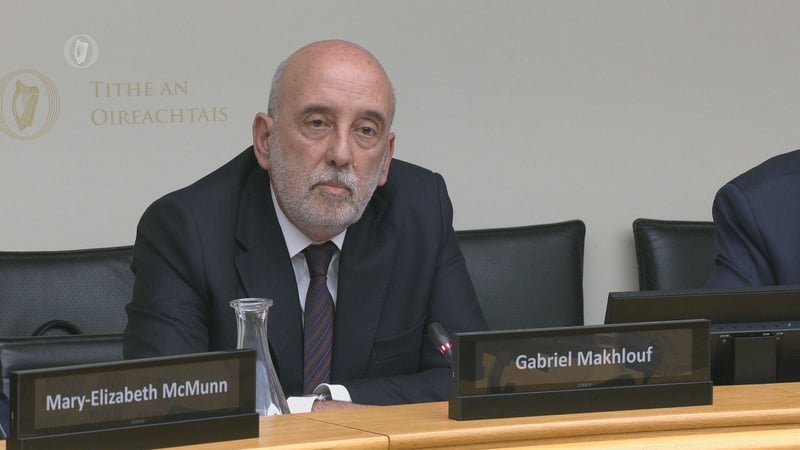The governor of the Central Bank has told politicians that it cannot refuse to facilitate the sale of Israel war bonds as doing so would break EU capital markets rules.
Gabriel Makhlouf outlined the position to the Oireachtas Committee on Finance and Public Expenditure this afternoon.
In a written opening statement to the committee, Mr Makhlouf said the Central Bank is “absolutely appalled” by what is happening in Gaza.
However, the bank is “required to perform” certain actions under EU rules, he said, adding “we are established by law, we are empowered by law, and we must always act within and in line with the law”.
Mr Makhlouf said: “One of the powers assigned to us is to perform the functions of a competent authority under the European Prospectus Regulation” and that “this means we must approve a prospectus once certain conditions are met”.
“We are required to approve a prospectus where it meets the standards of completeness, consistency and comprehensibility under the legislation.
“Our legal obligations are clear and we do not need guidance to follow them.
“For the avoidance of doubt the Central Bank does not issue, sell, trade or list these bonds. And in the case of Israeli sovereign bonds, we do not authorise or supervise them and they are not listed on a stock exchange we regulate.
“Under the Prospectus Regulation, it is up to the third-country sovereign to choose one EU member state to apply to for approval of its prospectus.
“The competent authority of the chosen member state is then obliged to discharge the relevant duties within the Prospectus Regulation. In effect the Central Bank is carrying out a role mandated by EU law.”
Mr Makhlouf said that while sanctions against Israel have been discussed in the Dáil, “the Central Bank has no mandate to impose sanctions on any state or person for breaches or alleged breaches of international law”.
“Unlike the EU sanctions against Russia after its invasion of Ukraine, the EU has not, at this time, adopted sanctions against the state of Israel.
“The Central Bank would of course implement any sanctions adopted by the EU that are applicable to the Central Bank’s functions, as we have with Russia.”
Speaking before Mr Makhlouf’s appearance at the committee, Sinn Féin’s spokesperson on finance Pearse Doherty said that the Central Bank could act even if it were challenged at an EU level.
“Makhlouf is correct in relation to the Central Bank’s role in terms of the Prospectus, and the Prospectus is about, the words are facilitating access to the European markets and that’s why we use the words that they are facilitating the sale of war bonds.
“They have a very clear role in relation to the accuracy of the Prospectus, and they make the point that Israel are not hiding the fact that the money raised in Ireland and the EU is being used to fund this war, this genocide, of which it really is.
“In my view, the Central Bank also has to be cognizant of the foundation treaties of the European Union and one of those is the upholding of international law and human rights and therefore in my view, the Central Bank could act, and they would be challenged no doubt, but could act in relation to that fact that there’s a genocide and therefore human rights and international law is being completely and utterly not breached but obliterated in these circumstances.”
Independent TD Catherine Connolly said the “narrow legal interpretation” taken by the Central Bank was “unacceptable”.
She said: “We’re watching genocide and as we watch, we’re all complicit in a genocide and there’s an obligation on us to take action.
“So when we look at the bonds, it is unacceptable the narrow legal interpretation that’s been taken, even within the existing law in Ireland and Europe, there is flexibility for them under international law and public policy grants.
“And if that’s not the case and I’m wrong, I’ll happily be corrected but I’d rather be wrong and take action then watch the slaughter that’s going on in our name.”

Dáil debates ban on facilitation of Israeli war bonds
The Central Bank’s meeting with the committee is taking place on the same day as the Dáil votes again on whether to ban the facilitation of Israeli war bonds in Ireland.
The cross-party motion was tabled during the Social Democrats speaking time this morning, with a Government counter-motion outlining the actions the Coalition has taken so far due to be voted on tonight.
During this morning’s debate, Social Democrats deputy leader Cian O’Callaghan said “genocide, let’s be clear, is taking place with the sale of Israeli war bonds” and that the Central Bank should “stop facilitating these bonds”.
He was supported by a number of party colleagues, including Gary Gannon, who said he believes the Government’s view is that “genocide is happening but Ireland must do nothing to affect GDP”.
Sinead Gibney said whatever the rules may be “we have to try” as it could create a “domino effect” among other countries.
Sinn Féin Spokesperson on Finance Pearse Doherty described the Government’s position as “shameful”, alongside party colleague Sean Crowe, who responded to recent Coalition comments that Ireland’s position is leading to tangible results.
“Gaza is flattened to the ground, people are starving, and you say you’re getting tangible results?,” he said.
“Ireland cannot be a conduit for blood money.”
Labour TD Ged Nash said regardless of EU rules Ireland should not facilitate Israeli war bonds and should instead “challenge the state of Israel to take us to the international courts”, a view repeated by Solidarity-People Before Profit TD Ruth Coppinger and Independent TD Catherine Connolly who said Government is engaged in “cognitive dissonance”.
Responding to the Opposition’s remarks, Minister for Finance Paschal Donohoe said there were “far more issues we agree on than do not agree on”, before saying if he “refrained from charges of naivety” against some opposition TDs, then he would like them to “refrain from charges or complicity or collaboration” against Government.
Minister Donohoe said Government is in his view working “relentlessly” to “build a diplomatic coalition” on the issue, and outlined a number of measures the coalition has taken so far.
Responding to the key point being discussed, he said: “I want to again set the record straight, the Central Bank does not oversee the sale of Israeli war bonds” and that the opposition motion “wouldn’t be consistent with EU law, it would undermine our obligations with the EU”.
That view was also outlined by a number of Government TDs, including Fianna Fáil TDs Paul McAuliffe and Robert Troy.
Independent TD Barry Heneghan, one of a number of Independent TDs who are supporting Government, voted against the coalition on a similar motion last month.
During the Dáil debate, he said the world is witnessing “one of the darkest moments in modern history” in Gaza.
He said when a person living in his constituency, who is from Gaza and whose relatives are still there, asked him what Ireland is doing to end the violence, “I couldn’t look him in the eye and say I was doing all I can”.
“We’ve all seen the images. Gazan children are being starved to death, in full view … It’s not about a technicality, it’s about us doing the right thing,” Mr Heneghan said.




